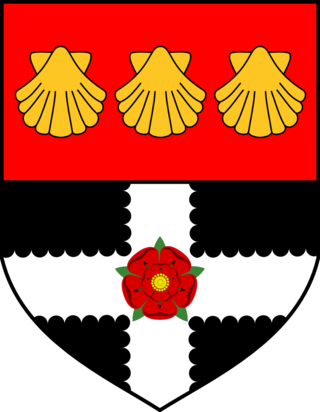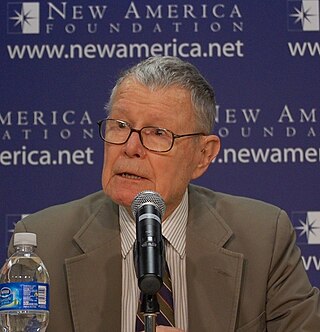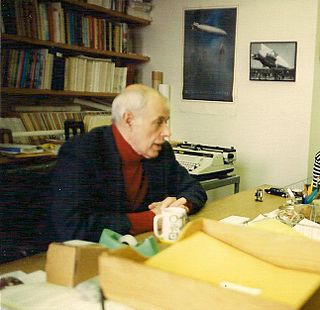
Paul Bracken is a professor of political science and business at Yale University. He received his Bachelor of Science (Engineering) degree from Columbia University and his PhD in Operations Research from Yale University. [1]

Paul Bracken is a professor of political science and business at Yale University. He received his Bachelor of Science (Engineering) degree from Columbia University and his PhD in Operations Research from Yale University. [1]
Bracken is a former employee of the Hudson Institute and served as a chronicler during the ultra secret 1983 war game code-named Proud Prophet. [2]
The Princeton Review called him one of the United States best 300 professors in 2012. [3]

Los Alamos National Laboratory is one of the sixteen research and development laboratories of the United States Department of Energy (DOE), located a short distance northwest of Santa Fe, New Mexico, in the American Southwest. Best known for its central role in helping develop the first atomic bomb, LANL is one of the world's largest and most advanced scientific institutions.

Robert Cox Merton is an American economist, Nobel Memorial Prize in Economic Sciences laureate, and professor at the MIT Sloan School of Management, known for his pioneering contributions to continuous-time finance, especially the first continuous-time option pricing model, the Black–Scholes–Merton model. In 1997 Merton together with Myron Scholes were awarded the Bank of Sweden Prize in Economic Sciences in Memory of Alfred Nobel for the method to determine the value of derivatives.

The University of Reading is a public research university in Reading, Berkshire, England. It was founded in 1892 as University College, Reading, a University of Oxford extension college. The institution received the power to grant its own degrees in 1926 by royal charter from King George V and was the only university to receive such a charter between the two world wars. The university is usually categorised as a red brick university, reflecting its original foundation in the 19th century.

Thomas Crombie Schelling was an American economist and professor of foreign policy, national security, nuclear strategy, and arms control at the School of Public Policy at University of Maryland, College Park. He was also co-faculty at the New England Complex Systems Institute.

Ashton Baldwin Carter was an American government official and academic who served as the 25th United States secretary of defense from February 2015 to January 2017. He later served as director of the Belfer Center for Science & International Affairs at Harvard Kennedy School.

The Yale School of Management is the graduate business school of Yale University, a private research university in New Haven, Connecticut. The school awards the Master of Business Administration (MBA), MBA for Executives (EMBA), Master of Advanced Management (MAM), Master's Degree in Systemic Risk (SR), Master's Degree in Global Business & Society (GBS), Master's Degree in Asset Management (AM), and Ph.D. degrees, as well as joint degrees with nine other graduate programs at Yale University. The Yale School of Management is one of six Ivy League Business Schools.

Professor Bill Durodié is a Professor of Politics, Languages and International Studies at the University of Bath, UK, as well as a former head of department there.
Daniel Paul Schrag is the Sturgis Hooper Professor of Geology, Professor of Environmental Science and Engineering at Harvard University and Director of the Harvard University Center for the Environment. He also co-directs the Science, Technology and Public Policy Program at the Belfer Center for Science and International Affairs at the Harvard University Harvard Kennedy School. He is also an external professor at the Santa Fe Institute.

Thazha Varkey Paul is an Indo-Canadian political scientist. He is a James McGill professor of International Relations in the department of Political Science at McGill University. Paul specializes in International Relations, especially international security, regional security and South Asia. He served as the president of the International Studies Association (ISA) during 2016–2017, and served as the founding director of the McGill University – Université de Montreal Centre for International Peace and Security Studies (CIPSS).
Louis René Beres is emeritus professor of political science and international law at Purdue University in West Lafayette, Indiana. He was born on August 31, 1945, in Zürich, Switzerland, and earned his Ph.D. at Princeton University in 1971. Beres has written many books and currently also writes editorials for various major newspapers and magazines.
Martin Shubik (1926-2018) was an American mathematical economist who specialized in game theory, defense analysis, and the theory of money. The latter was his main research interest and he referred to it as his "white whale". He also coined the term "mathematical institutional economics" in 1959 to describe his scholarly approach to studying the economy. He spent the majority of his career at Yale University, where he was heavily involved with the Cowles Foundation for Research in Economics, and launched the virtual Museum of Money and Financial Institutions.
Richard A. D'Aveni is an American academic, thought leader, business consultant, bestselling author and the Bakala Professor of Strategy at the Tuck School of Business at Dartmouth College. He is best known for creating a new paradigm in business strategy and coining the term “hypercompetition” which led Fortune to liken him to a modern version of Sun Tzu.

The RAND Corporation is an American nonprofit global policy think tank, research institute, and public sector consulting firm. RAND Corporation engages in research and development (R&D) in a number of fields and industries. Since the 1950s, RAND research has helped inform United States policy decisions on a wide variety of issues, including the space race, the Vietnam War, the U.S.-Soviet nuclear arms confrontation, the creation of the Great Society social welfare programs, and national health care.
Dr. William H. Overholt was a senior research fellow at John F. Kennedy School of Government's Mossavar-Rahmani Center for Business and Government at Harvard University and principal of AsiaStrat LLC, a consulting firm.

Warner Roller Schilling was an American political scientist and international relations scholar at Columbia University, where he was the James T. Shotwell Professor of International Relations. He was director of the university's Institute of War and Peace Studies from 1976 to 1986.
The Fletcher School's International Security Studies Program is a center for the study of international security studies and security policy development. It was established in 1971 at The Fletcher School of Law and Diplomacy, Tufts University. ISSP conducts its academic activity through courses, simulations, conferences, and research. It also has a military fellows program for midcareer U.S. officers.
Matthew James Connelly is an American professor of international and global history at Columbia University. His areas of expertise include the global Cold War, official secrecy, population control, decolonization, and methods to predict catastrophic threats. He is the author of Fatal Misconception: The Struggle to Control World Population, A Diplomatic Revolution: Algeria's Fight for Independence and the Origins of the Post-Cold War Era, The Declassification Engine: What History Reveals About America's Top Secrets, and articles on international and domestic politics for TheAtlantic Monthly, The New York Times, The National Interest, and Le Monde. Connelly is also the founder and principal investigator of History Lab.
Proud Prophet was a war game played by the United States that was designed by Thomas Schelling and began on June 20, 1983. The simulation was played in real time during the Cold War. Proud Prophet was essentially played to test out various proposals and strategies, in response to the Soviet Union's military buildup. There were advocates for a number of strategies, which varied from demonstration nuclear attacks, limited nuclear war, and decapitation attacks. It was not possible for the United States to pursue each of these strategies. President Ronald Reagan and his administration were faced with the dilemma of figuring out how the United States should respond to the Soviet Union's large nuclear programs, while finding which strategy would be most effective.
Kenneth George Young FAcSS FRHistS was a British political scientist and historian who was Professor of Public Policy at King's College London in its Department of War Studies. Earlier he was instrumental in the creation of the Department of Political Economy at KCL in 2010, and was its founding head of department.